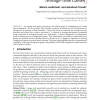Free Online Productivity Tools
i2Speak
i2Symbol
i2OCR
iTex2Img
iWeb2Print
iWeb2Shot
i2Type
iPdf2Split
iPdf2Merge
i2Bopomofo
i2Arabic
i2Style
i2Image
i2PDF
iLatex2Rtf
Sci2ools
FSTTCS
2008
Springer
2008
Springer
Average-Time Games
An average-time game is played on the infinite graph of configurations of a finite timed automaton. The two players, Min and Max, construct an infinite run of the automaton by taking turns to perform a timed transition. Player Min wants to minimize the average time per transition and player Max wants to maximize it. A solution of average-time games is presented using a reduction to average-price game on a finite graph. A direct consequence is an elementary proof of determinacy for average-time games. This complements our results for reachability-time games and partially solves a problem posed by Bouyer et al., to design an algorithm for solving average-price games on priced timed automata. The paper also establishes the exact computational complexity of solving average-time games: the problem is EXPTIME-complete for timed automata with at least two clocks.
Average-price Games | Average-time Games | FSTTCS 2008 | Software Engineering | finite Timed Automaton |
| Added | 09 Nov 2010 |
| Updated | 09 Nov 2010 |
| Type | Conference |
| Year | 2008 |
| Where | FSTTCS |
| Authors | Marcin Jurdzinski, Ashutosh Trivedi |
Comments (0)

